联合国豁免公约
限制豁免是否已经形成国际习惯法

限制豁免原则是否已经构成国家习惯法一、绝对豁免到限制豁免的发展 (1)(一)绝对豁免原则 (1)(二)限制豁免原则及其发展趋势 (2)二、各国关于国家豁免的实践 (3)三、公约 (5)(一)1926 年的《布鲁塞尔公约》 (5)(二)1969 年的《国际油污染损害民事责任公约》 (5)(三)1972 年的《欧洲国家豁免公约》 (6)(四)1982 年的《联合国海洋法公约》 (6)(五)《联合国国家及其财产豁免公约》 (6)四、刚果香港被诉案中法官观点总结 (7)(一)高等法院原讼法庭法官芮安牟的观点 (7)(二)高等法院上诉法庭法官 (8)(三)终审法院包致金法官的观点 (8)五、限制豁免原则已经形成国际习惯法 (9)一、绝对豁免到限制豁免的发展国家及其财产豁免权是一项公认的习惯国际法原则,但关于豁免的程度、范围和方式等,在国际社会无论是理论上还是实践中都存在着分歧。
从20世纪开始特别是二战以来,由于国家开始普遍地从事商业活动,出于对私人利益的保护,限制豁免理论出现,并逐渐产生了绝对豁免论和限制豁免论的对立。
(一)绝对豁免原则基于“平等者之间无管辖权”原则,任何法院都不能对发生其司法管辖区内的国家行使管辖权,除非该主权国家放弃此豁免权,仍证明法院地国对于外国主权国主权平等的承认。
国家豁免原则在各国判例实践和学界理论出现了两种不同的立场,一种被认为是“必须地排他的绝对的”的绝对豁免原则,即任何主权国家在外国法院都享有完全的或者绝对的豁免,除不动产和外国自愿同意之外,国内法院对外国任何行为都没有管辖权。
作为绝对豁免理论支持者的奥本海也认为:“国家平等的一个效果,是任何国家不能对另一国行使司法权。
因而国家虽然可以在外国法院提起诉讼,但是一般不能在外国法院被诉,除非它自愿服从该法院的管辖”。
美国著名学者海德认为:“一国不受任何其他国家的管辖,并且非经其同意,任何国家不得对其提起诉讼,这己是公认的学说”。
联合国国家及其财产管辖豁免公约中英对照
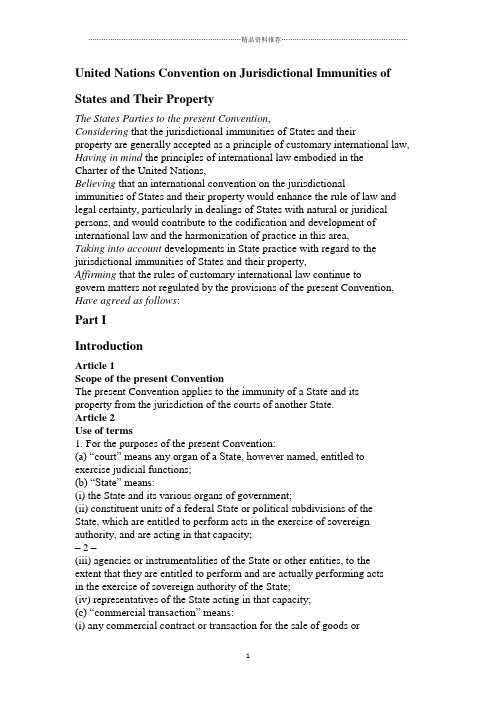
United Nations Convention on Jurisdictional Immunities of States and Their PropertyThe States Parties to the present Convention,Considering that the jurisdictional immunities of States and theirproperty are generally accepted as a principle of customary international law, Having in mind the principles of international law embodied in theCharter of the United Nations,Believing that an international convention on the jurisdictionalimmunities of States and their property would enhance the rule of law and legal certainty, particularly in dealings of States with natural or juridical persons, and would contribute to the codification and development of international law and the harmonization of practice in this area,Taking into account developments in State practice with regard to the jurisdictional immunities of States and their property,Affirming that the rules of customary international law continue togovern matters not regulated by the provisions of the present Convention, Have agreed as follows:Part IIntroductionArticle 1Scope of the present ConventionThe present Convention applies to the immunity of a State and itsproperty from the jurisdiction of the courts of another State.Article 2Use of terms1. For the purposes of the present Convention:(a) “court” means any organ of a State, however named, entitled to exercise judicial functions;(b) “State” means:(i) the State and its various organs of government;(ii) constituent units of a federal State or political subdivisions of the State, which are entitled to perform acts in the exercise of sovereign authority, and are acting in that capacity;– 2 –(iii) agencies or instrumentalities of the State or other entities, to theextent that they are entitled to perform and are actually performing actsin the exercise of sovereign authority of the State;(iv) representatives of the State acting in that capacity;(c) “commercial transaction” means:(i) any commercial contract or transaction for the sale of goods orsupply of services;(ii) any contract for a loan or other transaction of a financial nature, including any obligation of guarantee or of indemnity in respect of anysuch loan or transaction;(iii) any other contract or transaction of a commercial, industrial,trading or professional nature, but not including a contract ofemployment of persons.2. In determining whether a contract or transaction is a “commercial transaction” under paragraph 1 (c), reference should be made primarily to the nature of the contract or transaction, but its purpose should also be taken into account if the parties to the contract or transaction have so agreed, or if, in the practice of the State of the forum, that purpose is relevant to determining the non-commercial character of the contract or transaction.3. The provisions of paragraphs 1 and 2 regarding the use of terms in the present Convention are without prejudice to the use of those terms or to the meanings which may be given to them in other international instruments or in the internal law of any State.Article 3Privileges and immunities not affected by the present Convention1. The present Convention is without prejudice to the privileges and immunities enjoyed by a State under international law in relation to the exercise of the functions of:(a) its diplomatic missions, consular posts, special missions, missionsto international organizations or delegations to organs of international organizations or to international conferences; and(b) persons connected with them.2. The present Convention is without prejudice to privileges andimmunities accorded under international law to heads of State ratione personae.3. The present Convention is without prejudice to the immunities enjoyedby a State under international law with respect to aircraft or space objects owned or operated by a State.– 3 –Article 4Non-retroactivity of the present ConventionWithout prejudice to the application of any rules set forth in the present Convention to which jurisdictional immunities of States and their property are subject under international law independently of the present Convention, the present Convention shall not apply to any question of jurisdictional immunities of States or their property arising in a proceeding instituted against a State before a court of another State prior to the entry into force of the present Convention for the States concerned.Part IIGeneral principlesArticle 5State immunityA State enjoys immunity, in respect of itself and its property, from the jurisdiction of the courts of another State subject to the provisions of the present Convention.Article 6Modalities for giving effect to State immunity1. A State shall give effect to State immunity under article 5 by refraining from exercising jurisdiction in a proceeding before its courts against another State and to that end shall ensure that its courts determine on their own initiative that the immunity of that other State under article 5 is respected.2. A proceeding before a court of a State shall be considered to have been instituted against another State if that other State:(a) is named as a party to that proceeding; or(b) is not named as a party to the proceeding but the proceeding ineffect seeks to affect the property, rights, interests or activities of that other State.Article 7Express consent to exercise of jurisdiction1. A State cannot invoke immunity from jurisdiction in a proceeding beforea court of another State with regard to a matter or case if it has expressly consented to the exercise of jurisdiction by the court with regard to the matter or case:(a) by international agreement;(b) in a written contract; or– 4 –(c) by a declaration before the court or by a written communicationin a specific proceeding.2. Agreement by a State for the application of the law of another Stateshall not be interpreted as consent to the exercise of jurisdiction by the courts of that other State.Article 8Effect of participation in a proceeding before a court1. A State cannot invoke immunity from jurisdiction in a proceeding beforea court of another State if it has:(a) itself instituted the proceeding; or(b) intervened in the proceeding or taken any other step relating tothe merits. However, if the State satisfies the court that it could not have acquired knowledge of facts on which a claim to immunity can be based until after it took such a step, it can claim immunity based on those facts, provided it does so at the earliest possible moment.2. A State shall not be considered to have consented to the exercise ofjurisdiction by a court of another State if it intervenes in a proceeding or takes any other step for the sole purpose of:(a) invoking immunity; or(b) asserting a right or interest in property at issue in the proceeding.3. The appearance of a representative of a State before a court of another State as a witness shall not be interpreted as consent by the former State to the exercise of jurisdiction by the court.4. Failure on the part of a State to enter an appearance in a proceedingbefore a court of another State shall not be interpreted as consent by the former State to the exercise of jurisdiction by the court.Article 9Counterclaims1. A State instituting a proceeding before a court of another State cannot invoke immunity from the jurisdiction of the court in respect of any counterclaim arising out of the same legal relationship or facts as the principal claim.2. A State intervening to present a claim in a proceeding before a court of another State cannot invoke immunity from the jurisdiction of the court in respect of any counterclaim arising out of the same legal relationship or facts as the claim presented by the State.– 5 –3. A State making a counterclaim in a proceeding instituted against itbefore a court of another State cannot invoke immunity from the jurisdiction of the court in respect of the principal claim.Part IIIProceedings in which State immunity cannot be invokedArticle 10Commercial transactions1. If a State engages in a commercial transaction with a foreign natural or juridical person and, by virtue of the applicable rules of private international law, differences relating to the commercial transaction fall within the jurisdiction of a court of another State, the State cannot invoke immunity from that jurisdiction in a proceeding arising out of that commercial transaction.2. Paragraph 1 does not apply:(a) in the case of a commercial transaction between States; or(b) if the parties to the commercial transaction have expressly agreed otherwise.3. Where a State enterprise or other entity established by a State which hasan independent legal personality and is capable of:(a) suing or being sued; and(b) acquiring, owning or possessing and disposing of property,including property which that State has authorized it to operate or manage,is involved in a proceeding which relates to a commercial transaction in which that entity is engaged, the immunity from jurisdiction enjoyed by that State shall not be affected.Article 11Contracts of employment1. Unless otherwise agreed between the States concerned, a State cannot invoke immunity from jurisdiction before a court of another State which is otherwise competent in a proceeding which relates to a contract of employment between the State and an individual for work performed or to be performed, in whole or in part, in the territory of that other State.2. Paragraph 1 does not apply if:(a) the employee has been recruited to perform particular functions inthe exercise of governmental authority;(b) the employee is:– 6 –(i) a diplomatic agent, as defined in the Vienna Convention onDiplomatic Relations of 1961;(ii) a consular officer, as defined in the Vienna Convention onConsular Relations of 1963;(iii) a member of the diplomatic staff of a permanent mission to an international organization or of a special mission, or is recruited to represent a State at an international conference; or(iv) any other person enjoying diplomatic immunity;(c) the subject-matter of the proceeding is the recruitment, renewal of employment or reinstatement of an individual;(d) the subject-matter of the proceeding is the dismissal ortermination of employment of an individual and, as determined by the head of State, the head of Government or the Minister for Foreign Affairs of the employer State, such a proceeding would interfere with the security interests of that State;(e) the employee is a national of the employer State at the time whenthe proceeding is instituted, unless this person has the permanent residence in the State of the forum; or(f) the employer State and the employee have otherwise agreed inwriting, subject to any considerations of public policy conferring on the courts of the State of the forum exclusive jurisdiction by reason of the subject-matter of the proceeding.Article 12Personal injuries and damage to propertyUnless otherwise agreed between the States concerned, a State cannotinvoke immunity from jurisdiction before a court of another State which is otherwise competent in a proceeding which relates to pecuniary compensation for death or injury to the person, or damage to or loss of tangible property, caused by an act or omission which is alleged to be attributable to the State, ifthe act or omission occurred in whole or in part in the territory of that other State and if the author of the act or omission was present in that territory at the time of the act or omission.Article 13Ownership, possession and use of propertyUnless otherwise agreed between the States concerned, a State cannotinvoke immunity from jurisdiction before a court of another State which is otherwise competent in a proceeding which relates to the determination of:– 7 –(a) any right or interest of the State in, or its possession or use of, orany obligation of the State arising out of its interest in, or its possession or use of, immovable property situated in the State of the forum;(b) any right or interest of the State in movable or immovableproperty arising by way of succession, gift or bona vacantia; or(c) any right or interest of the State in the administration of property,such as trust property, the estate of a bankrupt or the property of a company in the event of its winding up.Article 14Intellectual and industrial propertyUnless otherwise agreed between the States concerned, a State cannotinvoke immunity from jurisdiction before a court of another State which is otherwise competent in a proceeding which relates to:(a) the determination of any right of the State in a patent, industrialdesign, trade name or business name, trademark, copyright or any other form of intellectual or industrial property which enjoys a measure of legal protection, even if provisional, in the State of the forum; or(b) an alleged infringement by the State, in the territory of the Stateof the forum, of a right of the nature mentioned in subparagraph (a) which belongs to a third person and is protected in the State of the forum.Article 15Participation in companies or other collective bodies1. A State cannot invoke immunity from jurisdiction before a court of another State which is otherwise competent in a proceeding which relates to its participation in a company or other collective body, whether incorporated or unincorporated, being a proceeding concerning the relationship between the State and the body or the other participants therein, provided that the body: (a) has participants other than States or international organizations;and(b) is incorporated or constituted under the law of the State of theforum or has its seat or principal place of business in that State.2. A State can, however, invoke immunity from jurisdiction in such a proceeding if the States concerned have so agreed or if the parties to the dispute have so provided by an agreement in writing or if the instrument establishing or regulating the body in question contains provisions to thateffect.– 8 –Article 16Ships owned or operated by a State1. Unless otherwise agreed between the States concerned, a State whichowns or operates a ship cannot invoke immunity from jurisdiction before a court of another State which is otherwise competent in a proceeding which relates to the operation of that ship if, at the time the cause of action arose, the ship was used for other than government non-commercial purposes.2. Paragraph 1 does not apply to warships, or naval auxiliaries, nor does it apply to other vessels owned or operated by a State and used, for the time being, only on government non-commercial service.3. Unless otherwise agreed between the States concerned, a State cannot invoke immunity from jurisdiction before a court of another State which is otherwise competent in a proceeding which relates to the carriage of cargo on board a ship owned or operated by that State if, at the time the cause of action arose, the ship was used for other than government non-commercial purposes.4. Paragraph 3 does not apply to any cargo carried on board the ships referred to in paragraph 2, nor does it apply to any cargo owned by a State and used or intended for use exclusively for government non-commercial purposes.5. States may plead all measures of defence, prescription and limitation of liability which are available to private ships and cargoes and their owners.6. If in a proceeding there arises a question relating to the government and non-commercial character of a ship owned or operated by a State or cargo owned by a State, a certificate signed by a diplomatic representative or other competent authority of that State and communicated to the court shall serve as evidence of the character of that ship or cargo.Article 17Effect of an arbitration agreementIf a State enters into an agreement in writing with a foreign natural or juridical person to submit to arbitration differences relating to a commercial transaction, that State cannot invoke immunity from jurisdiction before a court of another State which is otherwise competent in a proceeding which relates to:(a) the validity, interpretation or application of the arbitrationagreement;(b) the arbitration procedure; or(c) the confirmation or the setting aside of the award,unless the arbitration agreement otherwise provides.– 9 –Part IVState immunity from measures of constraint in connection withproceedings before a courtArticle 18State immunity from pre-judgment measures of constraintNo pre-judgment measures of constraint, such as attachment or arrest, against property of a State may be taken in connection with a proceeding before a court of another State unless and except to the extent that:(a) the State has expressly consented to the taking of such measuresas indicated:(i) by international agreement;(ii) by an arbitration agreement or in a written contract; or(iii) by a declaration before the court or by a written communicationafter a dispute between the parties has arisen; or(b) the State has allocated or earmarked property for the satisfactionof the claim which is the object of that proceeding.Article 19State immunity from post-judgment measures of constraintNo post-judgment measures of constraint, such as attachment, arrest or execution, against property of a State may be taken in connection with a proceeding before a court of another State unless and except to the extent that: (a) the State has expressly consented to the taking of such measuresas indicated:(i) by international agreement;(ii) by an arbitration agreement or in a written contract; or(iii) by a declaration before the court or by a written communicationafter a dispute between the parties has arisen; or(b) the State has allocated or earmarked property for the satisfactionof the claim which is the object of that proceeding; or(c) it has been established that the property is specifically in use orintended for use by the State for other than government non-commercial purposes and is in the territory of the State of the forum, provided that postjudgmentmeasures of constraint may only be taken against property that has a connection with the entity against which the proceeding was directed.– 10 –Article 20Effect of consent to jurisdiction to measures of constraintWhere consent to the measures of constraint is required under articles 18and 19, consent to the exercise of jurisdiction under article 7 shall not imply consent to the taking of measures of constraint.Article 21Specific categories of property1. The following categories, in particular, of property of a State shall notbe considered as property specifically in use or intended for use by the Statefor other than government non-commercial purposes under article 19, subparagraph (c):(a) property, including any bank account, which is used or intendedfor use in the performance of the functions of the diplomatic mission of the State or its consular posts, special missions, missions to international organizations or delegations to organs of international organizations or to international conferences;(b) property of a military character or used or intended for use in the performance of military functions;(c) property of the central bank or other monetary authority of theState;(d) property forming part of the cultural heritage of the State or partof its archives and not placed or intended to be placed on sale;(e) property forming part of an exhibition of objects of scientific,cultural or historical interest and not placed or intended to be placed on sale.2. Paragraph 1 is without prejudice to article 18 and article 19, subparagraphs (a) and (b).Part VMiscellaneous provisionsArticle 22Service of process1. Service of process by writ or other document instituting a proceeding against a State shall be effected:(a) in accordance with any applicable international conventionbinding on the State of the forum and the State concerned; or– 11 –(b) in accordance with any special arrangement for service betweenthe claimant and the State concerned, if not precluded by the law of the State of the forum; or(c) in the absence of such a convention or special arrangement:(i) by transmission through diplomatic channels to the Ministry ofForeign Affairs of the State concerned; or(ii) by any other means accepted by the State concerned, if notprecluded by the law of the State of the forum.2. Service of process referred to in paragraph 1 (c) (i) is deemed to have been effected by receipt of the documents by the Ministry of Foreign Affairs.3. These documents shall be accompanied, if necessary, by a translationinto the official language, or one of the official languages, of the State concerned.4. Any State that enters an appearance on the merits in a proceeding instituted against it may not thereafter assert that service of process did not comply with the provisions of paragraphs 1 and 3.Article 23Default judgment1. A default judgment shall not be rendered against a State unless the court has found that:(a) the requirements laid down in article 22, paragraphs 1 and 3, havebeen complied with;(b) a period of not less than four months has expired from the date onwhich the service of the writ or other document instituting a proceeding has been effected or deemed to have been effected in accordance with article 22, paragraphs 1 and 2; and(c) the present Convention does not preclude it from exercising jurisdiction.2. A copy of any default judgment rendered against a State, accompanied if necessary by a translation into the official language or one of the official languages of the State concerned, shall be transmitted to it through one of the means specified in article 22, paragraph 1, and in accordance with the provisions of that paragraph.3. The time-limit for applying to have a default judgment set aside shallnot be less than four months and shall begin to run from the date on which the copy of the judgment is received or is deemed to have been received by the State concerned.– 12 –Article 24Privileges and immunities during court proceedings1. Any failure or refusal by a State to comply with an order of a court of another State enjoining it to perform or refrain from performing a specific act or to produce any document or disclose any other information for the purposes of a proceeding shall entail no consequences other than those which may result from such conduct in relation to the merits of the case. In particular, no fine or penalty shall be imposed on the State by reason of such failure or refusal.2. A State shall not be required to provide any security, bond or deposit, however described, to guarantee the payment of judicial costs or expenses in any proceeding to which it is a respondent party before a court of another State.Part VIFinal clausesArticle 25AnnexThe annex to the present Convention forms an integral part of the Convention.Article 26Other international agreementsNothing in the present Convention shall affect the rights and obligationsof States Parties under existing international agreements which relate to matters dealt with in the present Convention as between the parties to those agreements.Article 27Settlement of disputes1. States Parties shall endeavour to settle disputes concerning the interpretation or application of the present Convention through negotiation.2. Any dispute between two or more States Parties concerning the interpretation or application of the present Convention which cannot be settled through negotiation within six months shall, at the request of any of those States Parties, be submitted to arbitration. If, six months after the date of the request for arbitration, those States Parties are unable to agree on the organization of the arbitration, any of those States Parties may refer the dispute to the International Court of Justice by request in accordance with the Statute of the Court.– 13 –3. Each State Party may, at the time of signature, ratification, acceptance or approval of, or accession to, the present Convention, declare that it does not consider itself bound by paragraph 2. The other States Parties shall not be bound by paragraph 2 with respect to any State Party which has made such a declaration.4. Any State Party that has made a declaration in accordance with paragraph 3 may at any time withdraw that declaration by notification to the Secretary-General of the United Nations.Article 28SignatureThe present Convention shall be open for signature by all States until17 January 2007, at United Nations Headquarters, New York.Article 29Ratification, acceptance, approval or accession1. The present Convention shall be subject to ratification, acceptance or approval.2. The present Convention shall remain open for accession by any State.3. The instruments of ratification, acceptance, approval or accession shallbe deposited with the Secretary-General of the United Nations.Article 30Entry into force1. The present Convention shall enter into force on the thirtieth dayfollowing the date of deposit of the thirtieth instrument of ratification, acceptance, approval or accession with the Secretary-General of the United Nations.2. For each State ratifying, accepting, approving or acceding to the present Convention after the deposit of the thirtieth instrument of ratification,acceptance, approval or accession, the Convention shall enter into force on the thirtieth day after the deposit by such State of its instrument of ratification, acceptance, approval or accession.Article 31Denunciation1. Any State Party may denounce the present Convention by written notification to the Secretary-General of the United Nations.2. Denunciation shall take effect one year following the date on which notification is received by the Secretary-General of the United Nations. The present Convention shall, however, continue to apply to any question of– 14 –jurisdictional immunities of States or their property arising in a proceeding instituted against a State before a court of another State prior to the date on which the denunciation takes effect for any of the States concerned.3. The denunciation shall not in any way affect the duty of any State Partyto fulfil any obligation embodied in the present Convention to which it would be subject under international law independently of the present Convention. Article 32Depositary and notifications1. The Secretary-General of the United Nations is designated thedepositary of the present Convention.2. As depositary of the present Convention, the Secretary-General of the United Nations shall inform all States of the following:(a) signatures of the present Convention and the deposit ofinstruments of ratification, acceptance, approval or accession or notifications of denunciation, in accordance with articles 29 and 31;(b) the date on which the present Convention will enter into force, in accordance with article 30;(c) any acts, notifications or communications relating to the present Convention.Article 33Authentic textsThe Arabic, Chinese, English, French, Russian and Spanish texts of the present Convention are equally authentic.IN WITNESS WHEREOF, the undersigned, being duly authorizedthereto by their respective Governments, have signed this Convention opened for signature at United Nations Headquarters in New York on 17 January 2005. – 15 –Annex to the ConventionUnderstandings with respect to certain provisions of the Convention。
对《联合国国家及其财产管辖豁免公约》侵权例外条款的分析
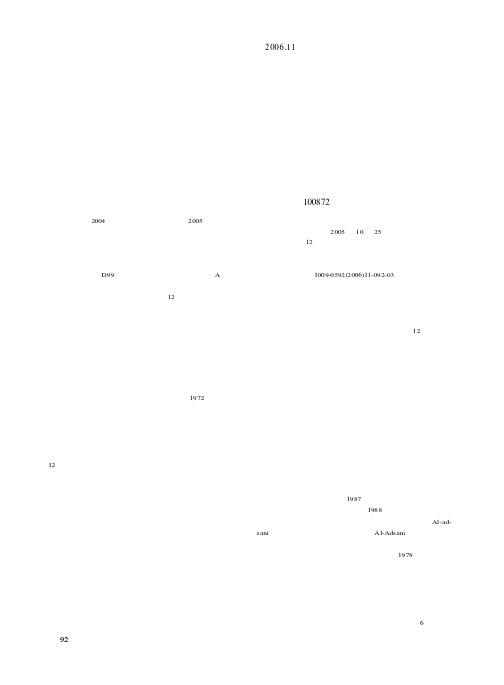
特殊。美国 1976 年《外国主权豁免法》第 1605 条(a)款(5)项 造成有形损害。这与公约和大多数国家立场相同。在 Fogarty
规定, “由于外国国家或其官员、雇员在职务或雇佣范围内的行 v. United Kingdom 一案中,爱尔兰人 Mary Fogarty 向美国设于
动中侵权作为或不作为,在美国境内造成人身伤害、死亡或者 伦敦的工业法庭起诉,要求依据 1975 年的性别歧视法和其遭
另外,尽管采用“损害结果发生地”原则的国家并不多,但 是仍有一定的影响力。如加拿大的《国家豁免法》第 6 条规定:
法制与社会 2006.11
法律经纬
“在加拿大境内造成任何人员伤亡或财产损害或丧失的诉讼中, 身体伤害无关的精神和名誉损害”的做法。另外,其认为侵犯
相关外国国家不享有法院的管辖豁免。”而美国的做法就稍显 合同权利或其他权利,包括对经济社会权利的侵犯并不能认为
最新电大国际公法形考作业任务0105网考试题及答案

最新电大《国际公法》形考作业任务01-05网考试题及答案100%通过考试说明:《国际公法》形考共有5个任务,任务1、任务2、任务3、任务4是是客观题,本人对任务1至4给出了标准答案(第1次任务_0001、国际公法02_0001、国际公法03_0001、国际公法04_0001)。
在考试中,可以多次抽取任务1至4试卷,直到出现这几套试卷中的任意一套,就可以按照该套试卷答案答题。
做考题时,利用本文档中的查找工具,把考题中的关键字输到查找工具的查找内容框内,就可迅速查找到该题答案。
本文库还有其他教学考一体化答案,敬请查看。
01任务第1次任务_0001一、单项选择题(共 20 道试题,共 40 分。
)1.甲国发生的叛乱运动已经被甲国政府和国际社会承认为叛乱团体。
该叛乱在其控制的一些地区,强行掠夺或占用外国侨民和外国国家的财产。
下列关于甲国政府是否承担责任的说法哪个是正确的?A. 承担直接责任B. 承担间接责任C. 甲国政府和叛乱运动共同承担直接责D. 不承担责任2. 最先把国际法著作系统的译成中文的人是( )。
A. 林则徐B. 严复C. 丁韪良D. 张之洞3. 认为国际法的效力依据源于人类良知、理性和法律意识的学派叫做()。
A. 实在法学派B. 规范法学派C. 格老秀斯派D. 自然法学派4. 被誉为国际法创始人的是荷兰著名法学家( )。
A. 克林顿B. 格老秀斯C. 普芬道夫D. 瓦特尔5. 对中华人民共和国的承认,属于对()的承认。
A. 新国家B. 新政体C. 新政府D. 新国体6. 关于国家管辖豁免问题,()立场在19世纪末期由比利时和意大利等国的司法判例正式确认。
A. 绝对主义B. 普遍主义C. 限制主义D. 连带主义7. ( )被视为是近代国际法形成的标志的事件之一。
A. 国际联盟的成立B. 《战争与和平法》的发表C. 《陆战法规惯例公约》的签订D. 《联合国宪章》的制定8. 关于国家行使自卫权,下列哪个说法是正确的?()。
关于国际法院与联合国核心人权公约的实施

关于国际法院与联合国核心人权公约的实施一、前言联合国核心人权公约指的是在联合国主持下通过的9 项核心国际人权公约及其议定书。
长期以来,联合国一直致力于促进核心人权公约在国内和国际社会两个层面得到实施。
从国内层面来讲,公约的实施是指缔约国在国内采取纳入或转化的方式将公约并入国内法,并保证这些国内法的执行; 从国际层面来看,公约的实施主要是指通过公约自身所建立的实施监督机制,保证缔约国能够切实履行公约义务。
但除此之外,公约的实施还包括其他促进公约权利得以实现的机制,比如作为联合国主要司法机关的国际法院,曾在案件中涉及核心人权公约的解释和适用问题。
这些解释和适用,连同条约机构的监督机制和缔约国国内的履行措施,共同促进了核心人权公约的实施。
国际法院有权受理与核心人权公约实施相关的案件,是由于一些公约中包含了将争端提交国际法院解决的条款,而国际法治的发展也使得越来越多的国家愿意将案件提交国际法院。
此外,很多国际法院的法官曾从事过人权相关工作,从而进一步加强了国际法院妥善处理与人权公约实施相关案件的能力与信心。
虽然国际法院并非专门的人权法院,但作为联合国的主要司法机关,它可以利用其专业优势及实践经验为核心人权公约的解释和适用提供权威法律意见。
这些法律意见不仅在广度和深度方面要优于专门的公约实施监督机构,而且在效力方面也要强于后者,因为国际法院作出的判决会对争端当事国产生法律拘束力。
本文根据案件所涉主题的性质,将其分为两类: 第一类案件涉及核心人权公约实施的一般国际法问题,包括人权与主权的关系、人权公约在特殊情形下的适用、对一切义务( obilgations ergaomne) 、人权违反案件中的个人赔偿问题等; 第二类案件涉及核心人权公约具体条款的解释和适用问题,包括《公民权利和政治权利国际公约》所规定的民族自决权、禁止任意逮捕和拘禁的权利、公正审判权、《消除一切形式种族歧视公约》的适用、《禁止酷刑公约》中或起诉或引渡条款、核心人权公约中的争端解决条款等。
污点证人作证豁免制度评析与构建——以《联合国反腐败公约》为视角

4 款规定 : 对提供实质性配合的被告人的保 护 , 当变通适 应 用《 公约》 中保护证人 、 鉴定人 和被 害人 的有关规 定。第 5 款规定 : 提供实质性 配合 的被告 人可享有另一缔约国提供 的减轻处罚和不予起诉的待遇。
( ) 二 污点证人作证豁免制度与辩诉 交易制度的异 同
去 了审判 中的证 明责任同时减少 了败诉风 险 ;就辩 方而
是指犯罪活动的参与者为减轻或者免 除 自己的刑事责任 , 与 国家追诉机关 合作 , 作为控方 证人 , 指证其他犯 罪人犯 罪事实的人。” 为一种特 殊的证人 , 【 l 怍 污点证人与一般证 人 的区别在于 : 污点证人的行为 已经具备刑法规定 的犯罪
社会 的政 治难题 。腐败犯罪具有复杂性 、 隐蔽性和调查取 证难 等特点 , 为有效 打击和惩 治腐 败犯 罪 ,联合国反腐败 《 公约》以下简称 公约》第 3 条“ ( : 《 ) 7 与执法机关 的合作 ” 规 定 了污点证人作证豁免制度 。本 文以《 公约》 为视角 , 对污 点证人作证豁免制度进行较深入评析 和探讨 , 出构建 并提
污点证人 作证豁免制度 的具体 建议。 【 关键词 】污点证人 ; 作证豁免 ; 辩诉交易; 腐败犯罪
【 中冒分类号 l D 1. 【 951 文献标识码 】 A 【 3 文章编号 】】o- D62 1)20 8- 2 0933(O 11-000 -
上世纪 8 年代 以来 ,腐败犯 罪已成为困扰当代国际 0
【 作者简介 】 马宜生(9 3 )女 , 16 一 , 天津人 , 中共天津市委党校法学教研部 副教授 ; 研究方向 : 刑法学 。
・
8 ・ 0
言, 是获得较轻处罚的判决或者被减少 了犯罪指控。其 四 ,
《维也纳领事关系公约》1979年8月1日对中国生效

一、领馆馆长由派遣国委派,并由接受国承认准予执行职务。
二、除本公约另有规定外,委派及承认领馆馆长之手续各依派遣国及接受国之法律规章与惯例办理。
第十一条 领事委任文凭或委派之通知
一、领馆馆长每次奉派任职,应由派遣国发给委任文凭或类似文书以充其职位之证书,其上通例载明馆长之全名,其职类与等级,领馆辖区及领馆设置地点。
三、接受国主管机关应予代理馆长以协助及保护。代理馆长主持馆务期间应在与领馆馆长相同之基础上适用本公约各项规定。惟如领馆馆长系在代理馆长并不具备之条件下始享受便利、特权与豁免时,接受国并无准许代理馆长享受此种便利、特权与豁免之义务。
四、遇本条第一项所称之情形,派遣国驻接受国使馆之外交职员奉派遣国派为领馆代理馆长时,倘接受国不表反对,应继续享有外交特权与豁免。
第十八条 两个以上国家委派同一人为领事官员
两个以上国家经接受国之同意得委派同一人为驻该 国之领事官员。
第十九条 领 馆 馆 员 之 委 派
一、除第二十条、第二十二条及第二十三条另有规定外,派遣国得自由委派领馆馆员。
二、派遣国应在充分时间前将领馆馆长以外所有领事官员之全名、职类及等级通知接受国,俾接受国得依其所愿,行使第二十三条第三项所规定之权利。
1.国与国间的领事关系通过协议建立。
2.领事职务包括:保护派遣国及其国民(个人与法人)的利益;促进派遣国与接受国的商业、经济、文化、科学及其他关系的发展;以合法手段调查接受国内的商业、经济等状况;向本国侨民颁发护照及旅行证件,向拟赴派遣国旅行之人士发签证或其他适当文件;给予本国侨民以及在接受国入港、入境的本国船舶、飞机及其人员以协助;办理公证、认证等。
第八条 代表第三国执行领事职务
联合国多边条约
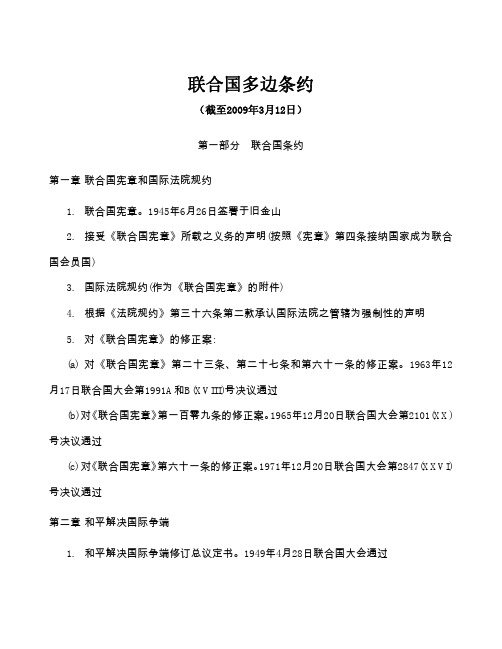
联合国多边条约(截至2009年3月12日)第一部分联合国条约第一章联合国宪章和国际法院规约1. 联合国宪章。
1945年6月26日签署于旧金山2. 接受《联合国宪章》所载之义务的声明(按照《宪章》第四条接纳国家成为联合国会员国)3. 国际法院规约(作为《联合国宪章》的附件)4. 根据《法院规约》第三十六条第二款承认国际法院之管辖为强制性的声明5. 对《联合国宪章》的修正案:对《联合国宪章》第二十三条、第二十七条和第六十一条的修正案。
1963年12 (a)月17日联合国大会第1991A和B(XVIII)号决议通过对《联合国宪章》第一百零九条的修正案。
1965年12月20日联合国大会第2101(XX) (b)号决议通过对《联合国宪章》第六十一条的修正案。
1971年12月20日联合国大会第2847(XXVI) (c)号决议通过第二章和平解决国际争端1. 和平解决国际争端修订总议定书。
1949年4月28日联合国大会通过第三章特权及豁免,外交和领事关系等1. 联合国特权和豁免公约。
1946年2月13日联合国大会通过2. 各专门机构特权及豁免公约。
1947年11月21日联合国大会核可3. 维也纳外交关系公约。
1961年4月18日订于维也纳4. 维也纳外交关系公约关于取得国籍之任意议定书。
1961年4月18日订于维也纳5. 维也纳外交关系公约关于强制解决争端之任意议定书。
1961年4月18日订于维也纳6. 维也纳领事关系公约。
1963年4月24日订于维也纳7. 维也纳领事关系公约关于取得国籍之任意议定书。
1963年4月24日订于维也纳8. 维也纳领事关系公约关于强制解决争端之任意议定书。
1963年4月24日订于维也纳9. 特种使节公约。
1969年12月8日联合国大会通过特种使节公约关于强制解决争端之任择议定书。
1969年12月8日联合国大会通过10.11.维也纳关于国家在其对普遍性国际组织关系上的代表权公约。
1975年3月14日缔结于维也纳关于国家对国家财产、档案和债务的继承的维也纳公约。
法考《国际法》复习题集(第1915篇)
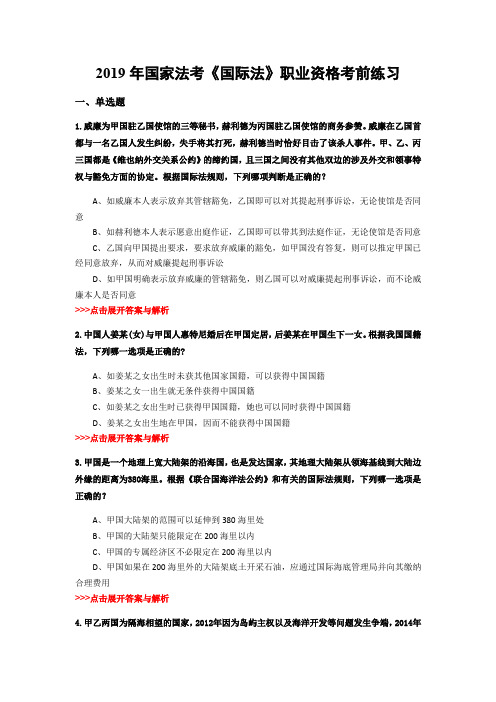
2019年国家法考《国际法》职业资格考前练习一、单选题1.威廉为甲国驻乙国使馆的三等秘书,赫利德为丙国驻乙国使馆的商务参赞。
威廉在乙国首都与一名乙国人发生纠纷,失手将其打死,赫利德当时恰好目击了该杀人事件。
甲、乙、丙三国都是《维也纳外交关系公约》的缔约国,且三国之间没有其他双边的涉及外交和领事特权与豁免方面的协定。
根据国际法规则,下列哪项判断是正确的?A、如威廉本人表示放弃其管辖豁免,乙国即可以对其提起刑事诉讼,无论使馆是否同意B、如赫利德本人表示愿意出庭作证,乙国即可以带其到法庭作证,无论使馆是否同意C、乙国向甲国提出要求,要求放弃威廉的豁免,如甲国没有答复,则可以推定甲国已经同意放弃,从而对威廉提起刑事诉讼D、如甲国明确表示放弃威廉的管辖豁免,则乙国可以对威廉提起刑事诉讼,而不论威廉本人是否同意>>>点击展开答案与解析2.中国人姜某(女)与甲国人惠特尼婚后在甲国定居,后姜某在甲国生下一女。
根据我国国籍法,下列哪一选项是正确的?A、如姜某之女出生时未获其他国家国籍,可以获得中国国籍B、姜某之女一出生就无条件获得中国国籍C、如姜某之女出生时已获得甲国国籍,她也可以同时获得中国国籍D、姜某之女出生地在甲国,因而不能获得中国国籍>>>点击展开答案与解析3.甲国是一个地理上宽大陆架的沿海国,也是发达国家,其地理大陆架从领海基线到大陆边外缘的距离为380海里。
根据《联合国海洋法公约》和有关的国际法规则,下列哪一选项是正确的?A、甲国大陆架的范围可以延伸到380海里处B、甲国的大陆架只能限定在200海里以内C、甲国的专属经济区不必限定在200海里以内D、甲国如果在200海里外的大陆架底土开采石油,应通过国际海底管理局并向其缴纳合理费用>>>点击展开答案与解析4.甲乙两国为隔海相望的国家,2012年因为岛屿主权以及海洋开发等问题发生争端,2014年1月和3月先后宣布与对方进入战争状态。
联合国特权和豁免公约
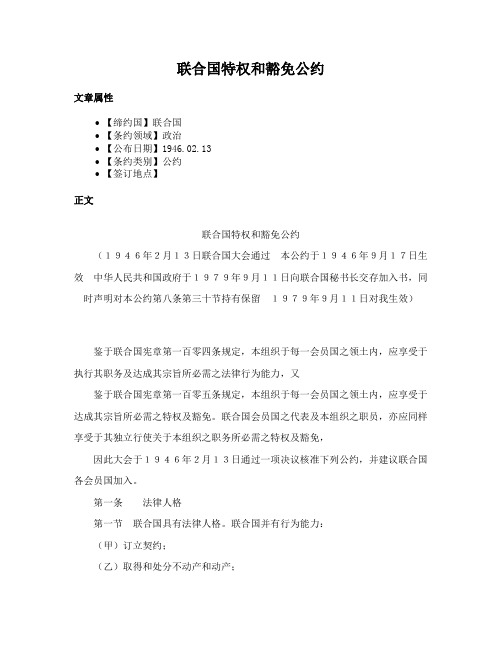
联合国特权和豁免公约文章属性•【缔约国】联合国•【条约领域】政治•【公布日期】1946.02.13•【条约类别】公约•【签订地点】正文联合国特权和豁免公约(1946年2月13日联合国大会通过本公约于1946年9月17日生效中华人民共和国政府于1979年9月11日向联合国秘书长交存加入书,同时声明对本公约第八条第三十节持有保留1979年9月11日对我生效)鉴于联合国宪章第一百零四条规定,本组织于每一会员国之领土内,应享受于执行其职务及达成其宗旨所必需之法律行为能力,又鉴于联合国宪章第一百零五条规定,本组织于每一会员国之领土内,应享受于达成其宗旨所必需之特权及豁免。
联合国会员国之代表及本组织之职员,亦应同样享受于其独立行使关于本组织之职务所必需之特权及豁免,因此大会于1946年2月13日通过一项决议核准下列公约,并建议联合国各会员国加入。
第一条法律人格第一节联合国具有法律人格。
联合国并有行为能力:(甲)订立契约;(乙)取得和处分不动产和动产;(丙)提起诉讼。
第二条财产、款项和资产第二节联合国,其财产和资产,不论其位置何处,亦不论由何人持有,对于各种方式的法律程序应享有豁免,但在特定情况下,经联合国明示抛弃其豁免时,不在此限。
惟缔约各国了解抛弃豁免不适用于任何强制执行措施。
第三节联合国的房舍不可侵犯。
联合国的财产和资产,不论其位于何处,亦不论由何人持有,应豁免搜查、征用、没收、征收和任何其他方式的干扰,不论是由于执行行为、行政行为、司法行为或立法行为。
第四节联合国的档案以及一般而论属于联合国或联合国所持有的一切文件不论其置于何处,均属不可侵犯。
第五节在不受任何财政管制、财政条例和延期偿付令的限制下,(甲)联合国得持有款项、黄金或任何货币,并得以任何货币运用账款;(乙)联合国得自一国至他国或在一国境内自由移转其款项、黄金或货币,并得将其所持有的任何货币换成任何其他货币。
第六节联合国于行使上述第五节的权利时,应适当顾及任何会员国政府所提的主张,但以认为能实行此种主张而不损害联合国的利益为限。
国际条约

《维也纳外交关系公约》1961年
《联合国海洋法公约》1982年
《联合国特权及豁免公约》
《国家与国际组织之间或国际组织之间维也纳条约法公约》
《关于防止和惩办灭种罪公约》1948年
《国际防止船舶造成污染公约》1973年
《维也纳领事关系公约》1963年
《特别使团公约》1969年
《关于防止和惩处侵害应受国际保护人员包括外交代表的罪行的公约》1973年
《关于国家在其对普遍性国际组织关系上的代表权的维也纳公约》1975年
《关于国家在条约方面的继承的维也纳公约》(关于条约继承的公约)1978年
《关于国家对国家财产、档案和债务的继承的维也纳公约》(关于国家财产、档案和债务继承的公约)1983年该公约尚未生效
《关于国家和国家组织间或国际组织相互间条约法的维也纳公约》1986年
《关于制止非法劫持航空器的公约》1970年
《国家及其财产管辖豁免公约》该公约尚未生效
《关于国籍法冲突的若干问题的公约》1930年
《关于难民地位的公约》1951
《关于无国籍人地位的公约》1954
《已婚妇女国际公约》1957
《减少无国籍状态公约》1961
《公民权利和政治权利国际公约》
《经济、社会和文化权利国际公约》
《世界人权宣言》
《保护工业产权巴黎公约》
《国际水道非航行使用法公约》1997年5.21通过,尚未生效。
联合国国家及其财产管辖豁免公约
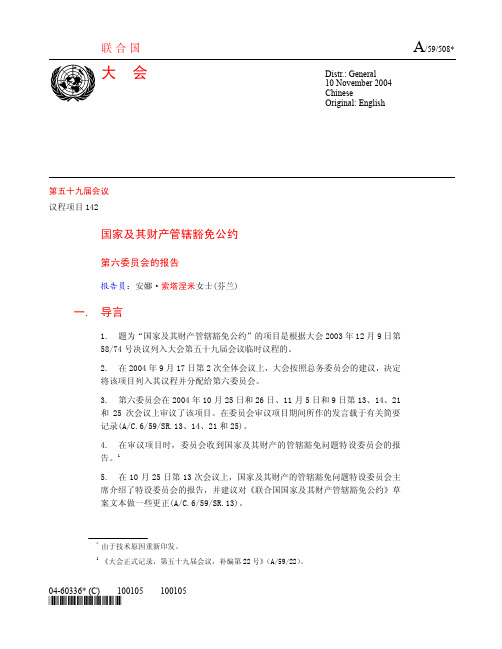
㈠ 起诉或被诉;和
㈡ 获得、拥有或占有和处置财产,包括国家授权其经营或管理的财产,
其卷入与其从事的商业交易有关的诉讼时,该国享有的管辖豁免不应受影 响。
A/59/508
7
A/59/508
第十一条 雇用合同
一. 除有关国家间另有协议外,一国在该国和个人间关于已全部或部分在另一国 领土进行,或将进行的工作之雇用合同的诉讼中,不得向该另一国原应管辖的法 院援引管辖豁免。
第一节 导言
第一条 本公约的范围
本公约适用于国家及其财产在另一国法院的管辖豁免。 第二条 用语 一. 为本公约的目的:
㈠ “法院”是指一国有权行使司法职能的不论名称为何的任何机关; ㈡ “国家”是指: 1. 国家及其政府的各种机关;
4
2. 有权行使主权权力并以该身份行事的联邦国家的组成单位或国家政治 区分单位;
4. 邀请各国成为《公约》缔约方。
附件 联合国国家及其财产管辖豁免公约
本公约缔约国, 考虑到国家及其财产的管辖豁免为一项普遍接受的习惯国际法原则, 铭记《联合国宪章》所体现的国际法原则, 相信一项关于国家及其财产的管辖豁免国际公约将加强法治和法律的确定 性,特别是在国家与自然人或法人的交易方面,并将有助于国际法的编纂与发展 及此领域实践的协调, 考虑到国家及其财产的管辖豁免方面国家实践的发展, 申明习惯国际法的规则仍然适用于本公约没有规定的事项, 议定如下:
A/59/508
5
A/59/508
第二节 一般原则
第五条 国家豁免
一国本身及其财产遵照本公约的规定在另一国法院享有管辖豁免。
第六条 实行国家豁免的方式
一. 一国应避免对在其法院对另一国提起的诉讼行使管辖,以实行第五条所规定 的国家豁免;并应为此保证其法院主动地确定该另一国根据第五条享有的豁免得 到尊重。
《联合国国家及其财产管辖豁免公约》评介
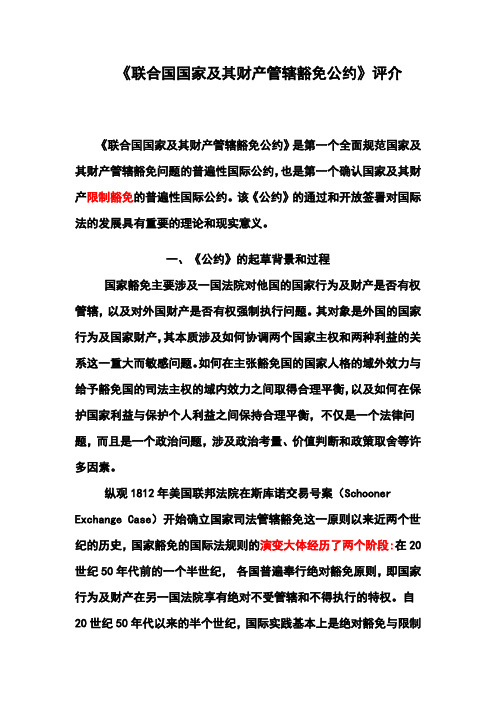
《联合国国家及其财产管辖豁免公约》评介《联合国国家及其财产管辖豁免公约》是第一个全面规范国家及其财产管辖豁免问题的普遍性国际公约,也是第一个确认国家及其财产限制豁免的普遍性国际公约。
该《公约》的通过和开放签署对国际法的发展具有重要的理论和现实意义。
一、《公约》的起草背景和过程国家豁免主要涉及一国法院对他国的国家行为及财产是否有权管辖,以及对外国财产是否有权强制执行问题。
其对象是外国的国家行为及国家财产,其本质涉及如何协调两个国家主权和两种利益的关系这一重大而敏感问题。
如何在主张豁免国的国家人格的域外效力与给予豁免国的司法主权的域内效力之间取得合理平衡,以及如何在保护国家利益与保护个人利益之间保持合理平衡,不仅是一个法律问题,而且是一个政治问题,涉及政治考量、价值判断和政策取舍等许多因素。
纵观1812年美国联邦法院在斯库诺交易号案(Schooner Exchange Case)开始确立国家司法管辖豁免这一原则以来近两个世纪的历史,国家豁免的国际法规则的演变大体经历了两个阶段:在20世纪50年代前的一个半世纪,各国普遍奉行绝对豁免原则,即国家行为及财产在另一国法院享有绝对不受管辖和不得执行的特权。
自20世纪50年代以来的半个世纪,国际实践基本上是绝对豁免与限制豁免两种原则并存,但国际上主张限制豁免原则的呼声渐高。
以英、美为代表的西方国家及部分发展中国家认为,国家和私人当事方在商业活动中的地位应当是平等的,国家在其商业性活动中不应享有特权,一国法院应对他国的商业活动有管辖权。
限制豁免原则把国家行为分为统治权行为(acta jure inperii)或称主权行为、公法行为与管理权行为。
(acta jure gestionis)或称非主权行为、私法行为,主张国家的立法、行政、司法等统治权行为可以享受豁免,而国家从事商业活动等非主权行为不能享受豁免。
美国、英国分别于1976年、1978年制订了有关限制豁免的国内立法,欧盟也在1972年制订了《欧洲国家豁免公约》,限制豁免的立法和司法实践逐渐盛行。
国家官员的外国刑事管辖豁免
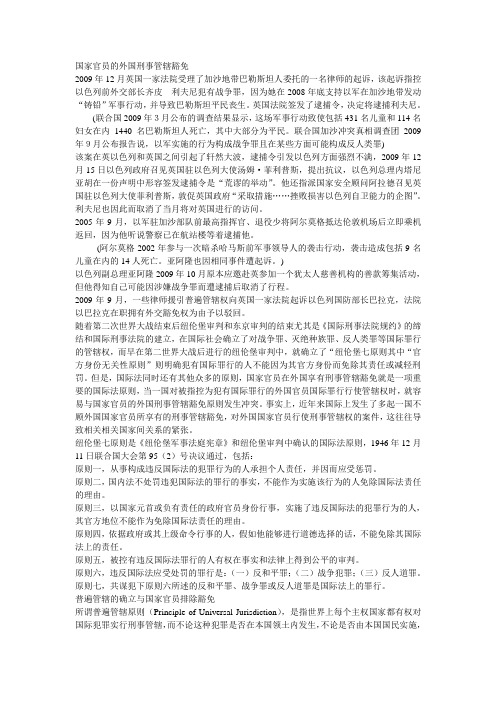
国家官员的外国刑事管辖豁免2009年12月英国一家法院受理了加沙地带巴勒斯坦人委托的一名律师的起诉,该起诉指控以色列前外交部长齐皮 利夫尼犯有战争罪,因为她在2008年底支持以军在加沙地带发动“铸铅”军事行动,并导致巴勒斯坦平民丧生。
英国法院签发了逮捕令,决定将逮捕利夫尼。
(联合国2009年3月公布的调查结果显示,这场军事行动致使包括431名儿童和114名妇女在内1440名巴勒斯坦人死亡,其中大部分为平民。
联合国加沙冲突真相调查团2009年9月公布报告说,以军实施的行为构成战争罪且在某些方面可能构成反人类罪)该案在英以色列和英国之间引起了轩然大波,逮捕令引发以色列方面强烈不满,2009年12月15日以色列政府召见英国驻以色列大使汤姆·菲利普斯,提出抗议,以色列总理内塔尼亚胡在一份声明中形容签发逮捕令是“荒谬的举动”。
他还指派国家安全顾问阿拉德召见英国驻以色列大使菲利普斯,敦促英国政府“采取措施……挫败损害以色列自卫能力的企图”。
利夫尼也因此而取消了当月将对英国进行的访问。
2005年9月,以军驻加沙部队前最高指挥官、退役少将阿尔莫格抵达伦敦机场后立即乘机返回,因为他听说警察已在航站楼等着逮捕他。
(阿尔莫格2002年参与一次暗杀哈马斯前军事领导人的袭击行动,袭击造成包括9名儿童在内的14人死亡。
亚阿隆也因相同事件遭起诉。
)以色列副总理亚阿隆2009年10月原本应邀赴英参加一个犹太人慈善机构的善款筹集活动,但他得知自己可能因涉嫌战争罪而遭逮捕后取消了行程。
2009年9月,一些律师援引普遍管辖权向英国一家法院起诉以色列国防部长巴拉克,法院以巴拉克在职拥有外交豁免权为由予以驳回。
随着第二次世界大战结束后纽伦堡审判和东京审判的结束尤其是《国际刑事法院规约》的缔结和国际刑事法院的建立,在国际社会确立了对战争罪、灭绝种族罪、反人类罪等国际罪行的管辖权,而早在第二世界大战后进行的纽伦堡审判中,就确立了“纽伦堡七原则其中“官方身份无关性原则”则明确犯有国际罪行的人不能因为其官方身份而免除其责任或减轻刑罚。
联合国特权和豁免公约
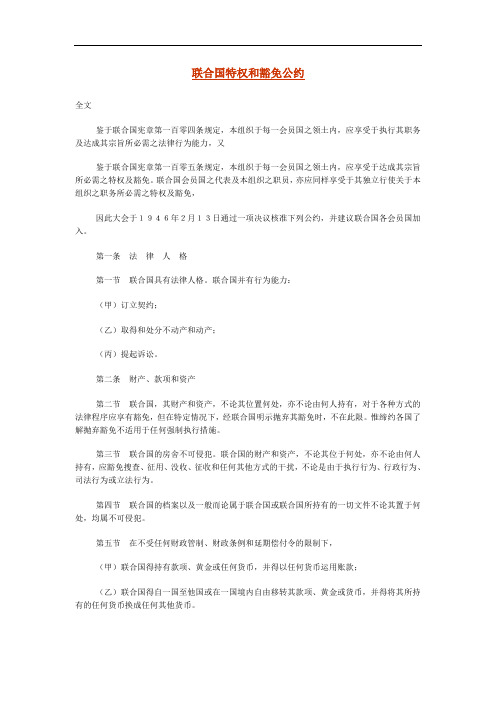
联合国特权和豁免公约全文鉴于联合国宪章第一百零四条规定,本组织于每一会员国之领土内,应享受于执行其职务及达成其宗旨所必需之法律行为能力,又鉴于联合国宪章第一百零五条规定,本组织于每一会员国之领土内,应享受于达成其宗旨所必需之特权及豁免。
联合国会员国之代表及本组织之职员,亦应同样享受于其独立行使关于本组织之职务所必需之特权及豁免,因此大会于1946年2月13日通过一项决议核准下列公约,并建议联合国各会员国加入。
第一条法律人格第一节联合国具有法律人格。
联合国并有行为能力:(甲)订立契约;(乙)取得和处分不动产和动产;(丙)提起诉讼。
第二条财产、款项和资产第二节联合国,其财产和资产,不论其位置何处,亦不论由何人持有,对于各种方式的法律程序应享有豁免,但在特定情况下,经联合国明示抛弃其豁免时,不在此限。
惟缔约各国了解抛弃豁免不适用于任何强制执行措施。
第三节联合国的房舍不可侵犯。
联合国的财产和资产,不论其位于何处,亦不论由何人持有,应豁免搜查、征用、没收、征收和任何其他方式的干扰,不论是由于执行行为、行政行为、司法行为或立法行为。
第四节联合国的档案以及一般而论属于联合国或联合国所持有的一切文件不论其置于何处,均属不可侵犯。
第五节在不受任何财政管制、财政条例和延期偿付令的限制下,(甲)联合国得持有款项、黄金或任何货币,并得以任何货币运用账款;(乙)联合国得自一国至他国或在一国境内自由移转其款项、黄金或货币,并得将其所持有的任何货币换成任何其他货币。
第六节联合国于行使上述第五节的权利时,应适当顾及任何会员国政府所提的主张,但以认为能实行此种主张而不损害联合国的利益为限。
第七节联合国,其资产、收入以及其他财产:(甲)应免除一切直接税;但联合国对于事实上纯为公用事业服务费用的税捐不得要求免除;(乙)对于联合国为公务用途而运入和运出的物品,应免除关税和进出口的禁止或限制;但这项免税进口的物品非依照与进口国政府商定的条件不得在该国出售;(丙)对于联合国的出版物,应免除关税以及进出口的禁止和限制。
王虎华-《联合国国家及其财产管辖豁免公约》规则的性质与适用

·新问题笔谈·政治与法律2007年第1期《联合国国家及其财产管辖豁免公约》规则的性质与适用王虎华罗国强(华东政法学院,上海200042)摘要:《联合国国家及其财产管辖豁免公约》规定了国家主权有限豁免的内容和标准。
《公约》有关有限豁免主义的规则是国际条约法规范,尚不能构成国际习惯法规范。
但《公约》的通过与日后的生效,将促使有限豁免主义发展成为国际习惯法。
《公约》规则在我国不应得到直接适用。
我国应制定关于国家及其财产豁免的法律,一方面将《公约》规则转化为国内法并在缔约国之间适用,另一方面对非缔约国(也包括对《公约》提出保留的缔约国)继续实行对等原则。
在今后的司法实践中,应以《公约》规则来解释国内法,从而使国内法与《公约》保持一致。
关键词:《联合国国家及其财产管辖豁免公约》;管辖豁免;执行豁免;国际公约中图分类号:DF92 文献标识码:A 文章编号:1005-9512(2007)01-0034-05《联合国国家及其财产管辖豁免公约》(以下简称《公约》)已经于2004年12月2日通过。
截止2006年12月5日,《公约》已经得到了25个国家的签署。
1 《公约》有望在2007年1月17日,即《公约》第28条所规定的开放签署截止日期前得到30个以上国家的签署。
我国已经于2005年9月14日签署了《公约》,故而可见,我国将在适当的时候批准《公约》,而生效后的《公约》也将在我国国内适用。
一、《公约》的主要规则及其性质(一)《公约》的主要规则首先,国家行为及财产在他国享有诉讼管辖豁免、诉讼保全豁免和强制执行豁免,2 但国家也可以通过明示同意、主动参与诉讼或反诉的方式放弃这些豁免。
其次,国家在商业交易、雇佣合同、侵权、财产权、知识产权、参加公司或其他集体机构、国家拥有或经营的船舶、仲裁协议的效果等8种例外情况下,不享有诉讼管辖豁免;判断是否属于商业交易,作者简介:王虎华,华东政法学院教授、博士生导师;罗国强,华东政法学院讲师、法学博士。
浅析联合国豁免公约草案中的强制措施条款_1

浅析联合国豁免公约草案中的强制措施条款摘要:自美、英相继出台《外国主权豁免法》和《国家豁免法》,国际上开始了“关于国家及其财产豁免和实践的大动荡”1;。
如果说国家豁免原则的绝对性和相对性国际还没有在理论上加以明确,那么在对国家利益能产生实质性的强制措施方面,各国事实上已经达成了某些方面的默契和共识(尽管还存在范围和程度的不同)。
本文主要了《联合国国家及其财产的管辖豁免公约》91年二读草案(以下简称公约草案)中的核心条款即有关强制措施的规定,结合有关国家的立法和实践,对其加以和归纳,并对我国在公约磋商和制定过程中应采取的立场提出一些建议。
一、;执行豁免的理论(一);理论关于执行豁免,存在2种学说或者说是实践做法,一种是一体说,如果国家行为及其财产享有管辖豁免,那么所涉国家财产也享有执行豁免,反之亦然,即将管辖豁免和执行豁免等同对待,此理论是绝对豁免论在执行方面的体现;还有一种是区分说,即将管辖豁免和执行豁免视为两个不同的问题区别对待,其中又有完全区分说和部分区分说,前者主张即使不享有管辖豁免,对国家财产的执行豁免的放弃仍需另行表示,后者规定一般需要另行表示,但某些财产符合如用于商业用途、与法院地有联系、与起诉商业活动有关等国内法条件的,则不享有执行豁免,如美、英、加拿大等国。
毕业论文(二);公约的立场从公约草案第四部分的行文来看,采取了完全区分的立场,同时在某些细节方面也有特殊的地方。
体现具体在:1、;公约第18条第2款明确规定,国家同意接受他国管辖并非默示同意采取强制措施,对于强制措施必须另行表示同意。
表示同意的方式在该条第一款做了列举即:国际协定、仲裁协议、事后声明等。
2、;即使在国家已经另行表示同意的情况下,仍需符合:(1)该国已就此诉讼拨了专项财产;或;(2)执行财产位于法院地国,并被该国用于或意图用于政府非商业用途以外的目的,且与诉讼标的要求有关,或者与被诉机构或部门有关。
(1);项较易理解,在实践中也比较容易区分,(2)项则是具体判定可否采取强制措施的实质条件,现将其分解开来进行分析:A、;地点(领土联系)公约规定执行的财产对象必须位于法院地国且在法院地国被用于商业目的,也就是说,执行对象与执行地国要存在领土联系。
国际法之条约保留
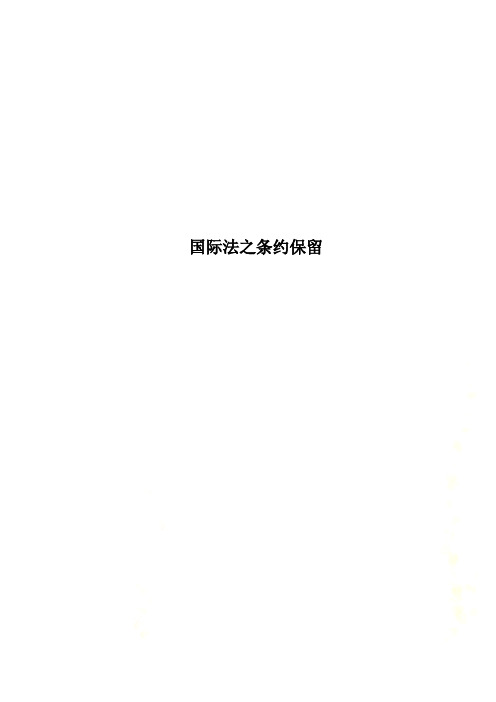
国际法之条约保留条约保留(一)概念与范围条约的保留是一国在签署、批准、接受、赞同或加入一个条约时所作的单方面声明,无论措词或名称如何,目的在于排除或更改条约中某些规定对该国适用时的法律效果。
(二)保留的特点:1、保留是单方面的声明活动,并不必然产生提出保留的缔约方所期望的法律效果。
一国可以对他国的保留提出反对,而对其他国家的保留不表态甚至表示接受。
相关案例:曾有14个国家一致对1946年《联合国特权与豁免公约》第8条有关强制解决争端的规定提出保留,英国对这14个国家的保留都提出反对,而黎巴嫩则只是对前苏联的保留提出了反对。
2、保留必须是一项书面声明。
3、保留须在一国表示同意承受条约拘束时提出保留不是随时可做出的,否则条约会处于不确定的状态。
公约规定,如果条约需要批准,则在签署时提出的保留需在批准时予以正式确认。
但有的条约本身就允许保留在任何时候提出,如1931年《统一支票法公约》。
4、保留通常是针对多边条约提出的5、保留的意义在于排除或更改条约适用的某些效果。
对一些义务性条款的保留,其实就是选择不承担相关的责任。
(一)不得保留的情形:1、条约规定禁止保留;2、条约准许特定的保留,而有关保留不在条约准许的保留范围之内;3、保留与条约的目的和宗旨不符。
相关案例:人权事务委员会意见:人权事务委员会1994年一般性评论第24号对《公民权利和政治权利国际公约》及其任择议定书的保留问题所表示的意见指出,对属于强行规范或习惯国际法的保留,对侵犯人权的行为提供救济保障的保留,或逃避委员会监督作用的保留,都不符合约的目的和宗旨。
与此相关的重点案例:这个条款是涉及结社权的,因为中国有一个《工会法》,中国认为《经济、社会、文化权利国际公约》第八条第一款的内容与《工会法》的规定有不一致的地方,所以做出保留,但是挪威、瑞典和荷兰这三个国家明确提出反对中国的这项保留。
它们在提出反对的同时还表示,这项保留与本公约的目的和宗旨是不一致的。
- 1、下载文档前请自行甄别文档内容的完整性,平台不提供额外的编辑、内容补充、找答案等附加服务。
- 2、"仅部分预览"的文档,不可在线预览部分如存在完整性等问题,可反馈申请退款(可完整预览的文档不适用该条件!)。
- 3、如文档侵犯您的权益,请联系客服反馈,我们会尽快为您处理(人工客服工作时间:9:00-18:30)。
仲裁协定的效果
一国如与外国一自然人或法人订立书面协议,将有关商业交易的争议提交仲裁,则该国不得在另一国原应管辖的法院有关下列事项的诉讼中援引管辖豁免;
(a)仲裁协议的有效性、解释或适用;
(b)仲裁程序;或
(c)裁决的确认或撤销,但仲裁协议另有规定者除外。
第四部分在法院诉讼中免于强制措施的国家豁免
首页|资讯|政策|国际|教育|旅游|文化|地方|华人社区|网上直播|认识中国|投资中国
新闻|图片|财经|军事|科技|体育|读书|妇女|权威论坛|中国访谈|图片中国|魅力城市
评论|专题|法制|博览|环境|奥运|健康|职场|文化周末|视频中国|艺术中国|供应商
设为首页|滚动|焦点|国内|国际|法制|财经|体育|教育|军事|文娱|科技|环境|旅游|时尚
(c)诉讼的事由是个人的招聘、雇用期的延长或复职;
(d)诉讼的事由是解雇个人或终止对其雇用,且雇用国的国家元首、政府首脑或外交部长认定该诉讼有碍该国安全利益;
(e)该雇员在诉讼提起时是雇用国的国民,除非此人长期居住在法院地国;或
(f)该雇员和雇用国另有书面协议,但由于公共政策的任何考虑,因该诉讼的事由内容而赋予法院地国法院专属管辖权者不在此限。
[打印文章][大中小]
联合国国家及其财产管辖豁免公约
中国网|时间:2006-08-08|文章来源:
第五十九届会议议程项目142
04-47853
大会决议
[根据第六委员会的报告(A/59/508)通过]
59/38.联合国国家及其财产管辖豁免公约
大会,
铭记《联合国宪章》第十三条第一项(子)款,
回顾其1977年12月19日第32/151号决议,其中建议国际法委员会着手研究国家及其财产管辖豁免的法律,以逐渐发展与编纂这些法律,并回顾其后大会1991年12月9日第46/55号、1994年12月9日第49/61号、1997年12月15日第52/151号、1999年12月9日第54/101号、2000年12月12日第55/150号、2001年12月12日第56/78号、2002年11月19日第57/16号和2003年12月9日第58/74号决议,
(a)被指名为该诉讼的当事一方;或
(b)未被指名为该诉讼的当事一方,但该诉讼实际上企图影响该另一国的财产、权利、利益或活动。
第7条
明示同意行使管辖
1.一国如以下列方式明示同意另一国对某一事项或案件行使管辖,则不得在该法院就该事项或案件提起的诉讼中援引管辖豁免:
(a)国际协定;
(b)书面合同;或
(c)在法院发表的声明或在特定诉讼中提出的书面函件。
3.当国家企业或国家所设其他实体具有独立的法人资格,并有能力:
(a)起诉或被诉;和
(b)获得、拥有或占有和处置财产,包括国家授权其经营或管理的财产,
其卷入与其从事的商业交易有关的诉讼时,该国享有的管辖豁免不应受影响。
第11条
雇用合同
1.除有关国家间另有协议外,一国在该国和个人间关于已全部或部分在另一国领土进行,或将进行的工作之雇用合同的诉讼中,不得向该另一国原应管辖的法院援引管辖豁免。
2.在确定一项合同或交易是否为第1款(c)项所述的“商业交易”时,应主要参考该合同或交易的性质,但如果合同或交易的当事方已达成一致,或者根据法院地国的实践,合同或交易的目的与确定其非商业性质有关,则其目的也应予以考虑。
3.关于本公约用语的第1款和第2款的规定不妨碍其他国际文书或任何国家的国内法对这些用语的使用或给予的含义。
2.一国同意适用另一国的法律,不应被解释为同意该另一国的法院行使管辖权。
第8条
参加法院诉讼的效果
1.在下列情况下,一国不得在另一国法院的诉讼中援引管辖豁免:
(a)该国本身提起该诉讼;或
(b)介入该诉讼或采取与案件实体有关的任何其他步骤。但如该国使法院确信它在采取这一步骤之前不可能知道可据以主张豁免的事实,则它可以根据那些事实主张豁免,条件是它必须尽早这样做。
3.本公约不妨碍国家根据国际法对国家拥有或运营的航空器或空间物体所享有的豁免。
第4条
本公约不溯及既往
在不妨碍本公约所述关于国家及其财产依国际法而非依本公约享有管辖豁免的任何规则的适用的前提下,本公约不应适用于在本公约对有关国家生效前,在一国法院对另一国提起的诉讼所引起的任何国家及其财产的管辖豁免问题。
(b)据称该国在法院地国领土内侵犯在法院地国受到保护的、属于第三者的
(a)项所述性质.一国在有关该国参加具有或不具有法人资格的公司或其他集体机构的诉讼中,即在关于该国与该机构或该机构其他参加者之间关系的诉讼中,不得向另一国原应管辖的法院援引管辖豁免,但有以下条件:
第18条
(c)该国对托管财产、破产者财产或公司解散前清理之财产的管理的任何权利或利益。
第14条
知识产权和工业产权
除有关国家间另有协议外,一国在有关下列事项的诉讼中不得向另一国原应管辖的法院援引管辖豁免:
(a)确定该国对在法院地国享受某种程度、即使是暂时的法律保护的专利、工业设计、商业名称或企业名称、商标、版权或任何其他形式的知识产权或工业产权的任何权利;或
㈢国家机构、部门或其他实体,但须它们有权行使并且实际在行使国家的主权权力;
㈣以国家代表身份行事的国家代表;
(c)“商业交易”是指:
㈠为销售货物或为提供服务而订立的任何商业合同或交易;
㈡任何贷款或其他金融性质之交易的合同,包括涉及任何此类贷款或交易的任何担保义务或补偿义务;
㈢商业、工业、贸易或专业性质的任何其他合同或交易,但不包括雇用人员的合同。
4.第3款不适用于第2款所指船舶所载运的任何货物,也不适用于国家拥有的、专门用于或意图专门用于政府非商业性用途的任何货物。
5.国家可提出私有船舶、货物及其所有人所能利用的一切抗辩措施、时效和责任限制。
6.如果在一项诉讼中产生有关一国拥有或经营的一艘船舶、或一国拥有的货物的政府非商业性质问题,由该国的一个外交代表或其他主管当局签署并送交法院的证明,应作为该船舶或货物性质的证据。
申明习惯国际法的规则仍然适用于本公约没有规定的事项,
议定如下:
第一部分导言
第1条
本公约的范围
本公约适用于国家及其财产在另一国法院的管辖豁免。
第2条
用语
1.为本公约的目的:
(a)“法院”是指一国有权行使司法职能的不论名称为何的任何机关;
(b)“国家”是指:
㈠国家及其政府的各种机关;
㈡有权行使主权权力并以该身份行事的联邦国家的组成单位或国家政治区分单位;
第3条
不受本公约影响的特权和豁免
1.本公约不妨碍国家根据国际法所享有的有关行使下列职能的特权和豁免:
(a)其外交代表机构、领事机构、特别使团、驻国际组织代表团,或派往国际组织的机关或国际会议的代表团的职能;和
(b)与上述机构有关联的人员的职能。
2.本公约不妨碍根据国际法给予国家元首个人的特权和豁免。
第二部分一般原则
第5条
国家豁免
一国本身及其财产遵照本公约的规定在另一国法院享有管辖豁免。
第6条
实行国家豁免的方式
1.一国应避免对在其法院对另一国提起的诉讼行使管辖,以实行第5条所规定的国家豁免;并应为此保证其法院主动地确定该另一国根据第5条享有的豁免得到尊重。
2.在一国法院中的诉讼应视为对另一国提起的诉讼,如果该另一国:
第9条
反诉
1.一国在另一国法院提起一项诉讼,不得就与本诉相同的法律关系或事实所引起的任何反诉向法院援引管辖豁免。
2.一国介入另一国法院的诉讼中提出诉讼请求,则不得就与该国提出的诉讼请求相同的法律关系或事实所引起的任何反诉援引管辖豁免。
3.一国在另一国法院对该国提起的诉讼中提出反诉,则不得就本诉向法院援引管辖豁免。
第12条
人身伤害和财产损害
除有关国家间另有协议外,一国在对主张由可归因于该国的作为或不作为引起的死亡或人身伤害、或有形财产的损害或灭失要求金钱赔偿的诉讼中,如果该作为或不作为全部或部分发生在法院地国领土内,而且作为或不作为的行为人在作为或不作为发生时处于法院地国领土内,则不得向另一国原应管辖的法院援引管辖豁免。
2.一国不应被视为同意另一国的法院行使管辖权,如果该国仅为下列目的介入诉讼或采取任何其他步骤:
(a)援引豁免;或
(b)对诉讼中有待裁决的财产主张一项权利或利益。
3.一国代表在另一国法院出庭作证不应被解释为前一国同意法院行使管辖权。
4.一国未在另一国法院的诉讼中出庭不应被解释为前一国同意法院行使管辖权。
又回顾国际法委员会在其第四十三届会议工作报告第二章中提出关于国家及其财产管辖豁免法律的条款草案终稿案文及评注,
还回顾根据大会1998年12月8日第53/98号决议规定提交的第六委员会不限成员名额工作组的报告,以及国际法委员会国家及其财产的管辖豁免问题工作组的报告,
回顾其第55/150号决议,其中决定设立国家及其财产的管辖豁免问题特设委员会,同时开放给各专门机构的成员国参加,以进一步推展已完成的工作,整理达成协议的方面和解决未决的问题,以期根据国际法委员会通过的国家及其财产管辖豁免条款草案,并根据第六委员会不限成员名额工作组的讨论,拟定一份一般可以接受的文书,
2.第1款不适用于下列情况:
(a)招聘该雇员是为了履行行使政府权力方面的特定职能;
(b)该雇员是:
㈠1961年《维也纳外交关系公约》所述的外交代表;
㈡1963年《维也纳领事关系公约》所述的领事官员;
㈢常驻国际组织代表团外交工作人员、特别使团成员或获招聘代表一国出席国际会议的人员;或
㈣享有外交豁免的任何其他人员;
(a)该机构的参加者不限于国家或国际组织;而且
(b)该机构是按照法院地国法律注册或组成,或其所在地或主要营业地位于法院地国。
2.但是,如果有关国家同意,或如果争端当事方之间的书面协议作此规定,或如果建立或管理有关机构的文书中载有此一规定,则一国可以在此诉讼中援引管辖豁免。
